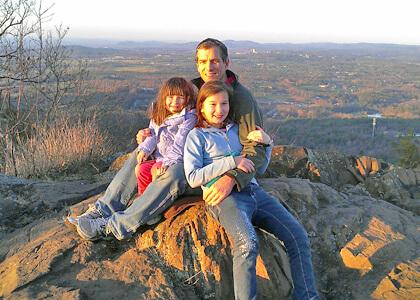At the North Atlantic Landscape Conservation Cooperative (LLC) in Massachusetts, Scott Schwenk (PhD-NR ’07) delivers conservation strategies to protect the Northern Forest landscape and wildlife in the face of climate change and other stressors. His goal is to help conservation managers understand the current and potential future condition of the Northern Forest in the face of climate change and other stressors and to assist in developing management and adaptation strategies to protect the Northern Forest.
Scott began studying and working in the Northern Forest during his undergraduate years at Dartmouth College, where he received an A.B. in biology. He gained exposure to first-hand research during two summers as a research assistant at the Hubbard Brook Experimental Forest in New Hampshire.
After finishing his bachelor’s degree, he spent 15 years working for the U.S. Environmental Protection Agency (EPA) while working part-time on a master’s degree in public health at Johns Hopkins University. Early on at the EPA, Scott’s assignments included assuring the safe disposal of banned pesticides and the development of public educational materials on topics such as health risks from pesticides. He later worked as a science coordinator for the EPA Risk Assessment Forum, where he facilitated teams of scientists in planning ecological risk assessments and assessing ecological risks from dioxins and related compounds.
Scott finished at the EPA in 2003 to begin full-time study in a doctoral program at the Rubenstein School with Associate Professor Allan Strong. In working towards his PhD in wildlife ecology, Scott received funding from the Northeastern States Research Cooperative (NSRC) to study the many interactions among birds, insects, trees, and the environment in the Northern Forest ecosystem. After completing his PhD, the NSRC supported Scott's research in a post-doctoral position with the Vermont Cooperative Fish & Wildlife Research Unit at UVM. Along with Associate Professor Terri Donovan, he worked to develop methods for assessing how land use and forest management practices affect biodiversity and wildlife occurrence.
Regarding their research, Terri Donovan notes, “Timber management is an important activity in the Northern Forest, and individual landowners are motivated to manage their lands for different reasons. Some may value wildlife biodiversity. Others may want to maximize income. Scott's approaches can help landowners evaluate how different management strategies would affect carbon storage, wildlife biodiversity, and board-feet harvested. This is very powerful because it lets the landowner visualize the tradeoffs involved.”
Scott acknowledges that his NSRC-funded projects were instrumental in supporting his training as a wildlife and landscape ecologist. They offered him the opportunity to gain experience in all facets of ecological research, including study design, execution of fieldwork, supervision of field assistants, data collection and management, statistical analysis, and synthesis and dissemination of research results.
Now, as the science coordinator for the North Atlantic LCC, he is responsible for working with partners across the Northeast to implement a science program that will deliver conservation information and tools to support landscape-scale conservation by states, federal agencies, nongovernmental organizations, and others. In addition to his work at the LCC, Scott has been a committee member for the Vermont Scientific Advisory Group on Birds, providing scientific advice to the Vermont Endangered Species Committee.
Outside of work, his three daughters keep him and his family very busy. Whenever possible, he enjoys hiking and exploring the Northern Forest.
